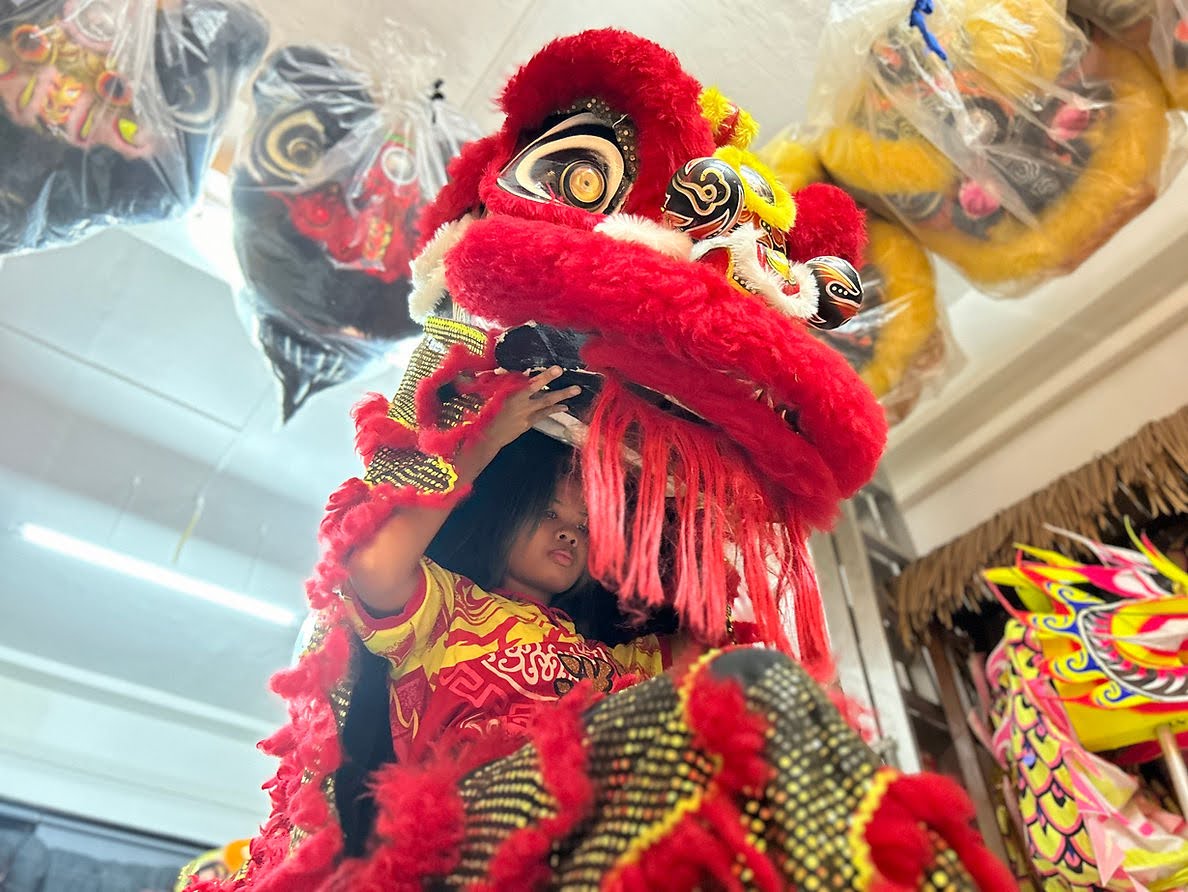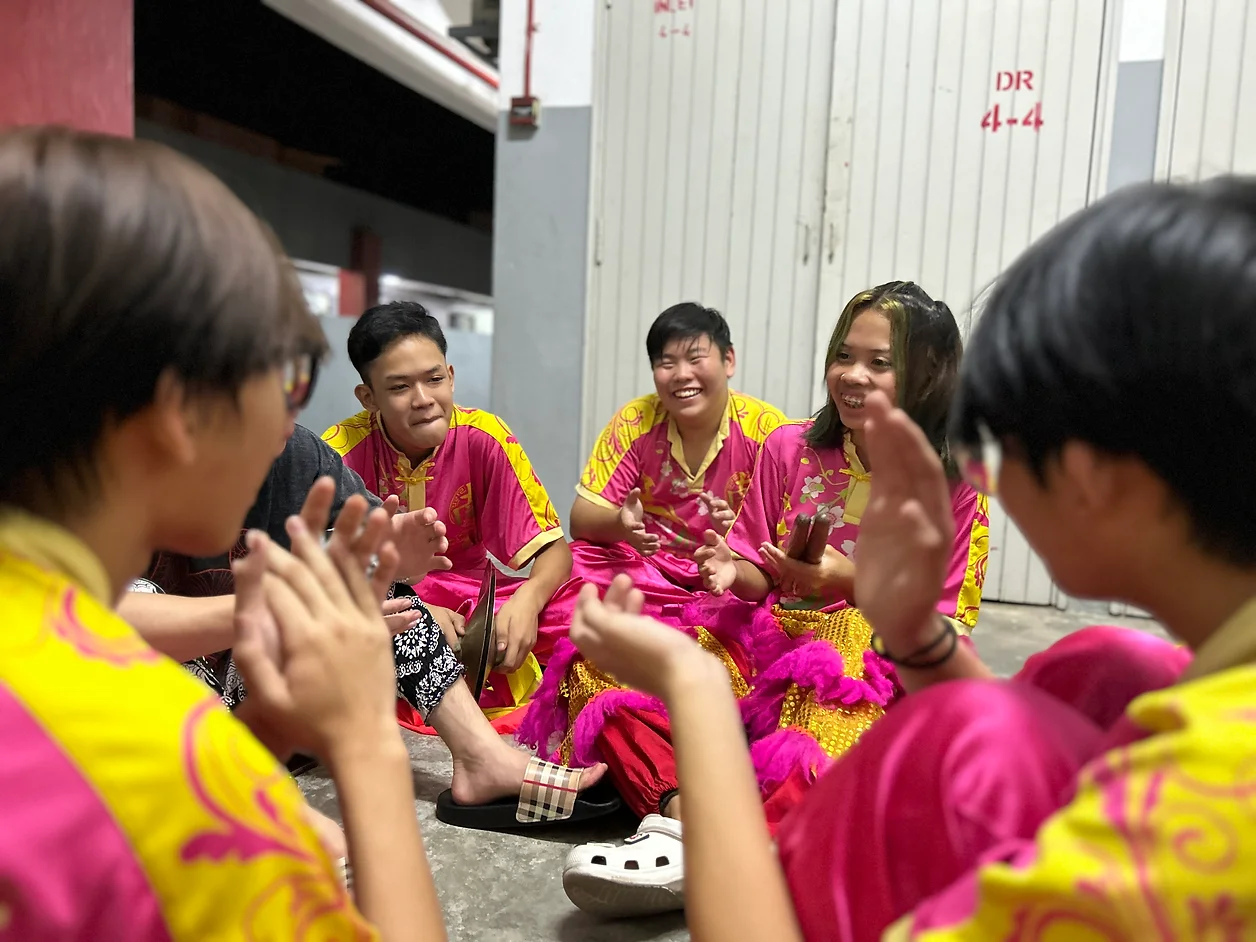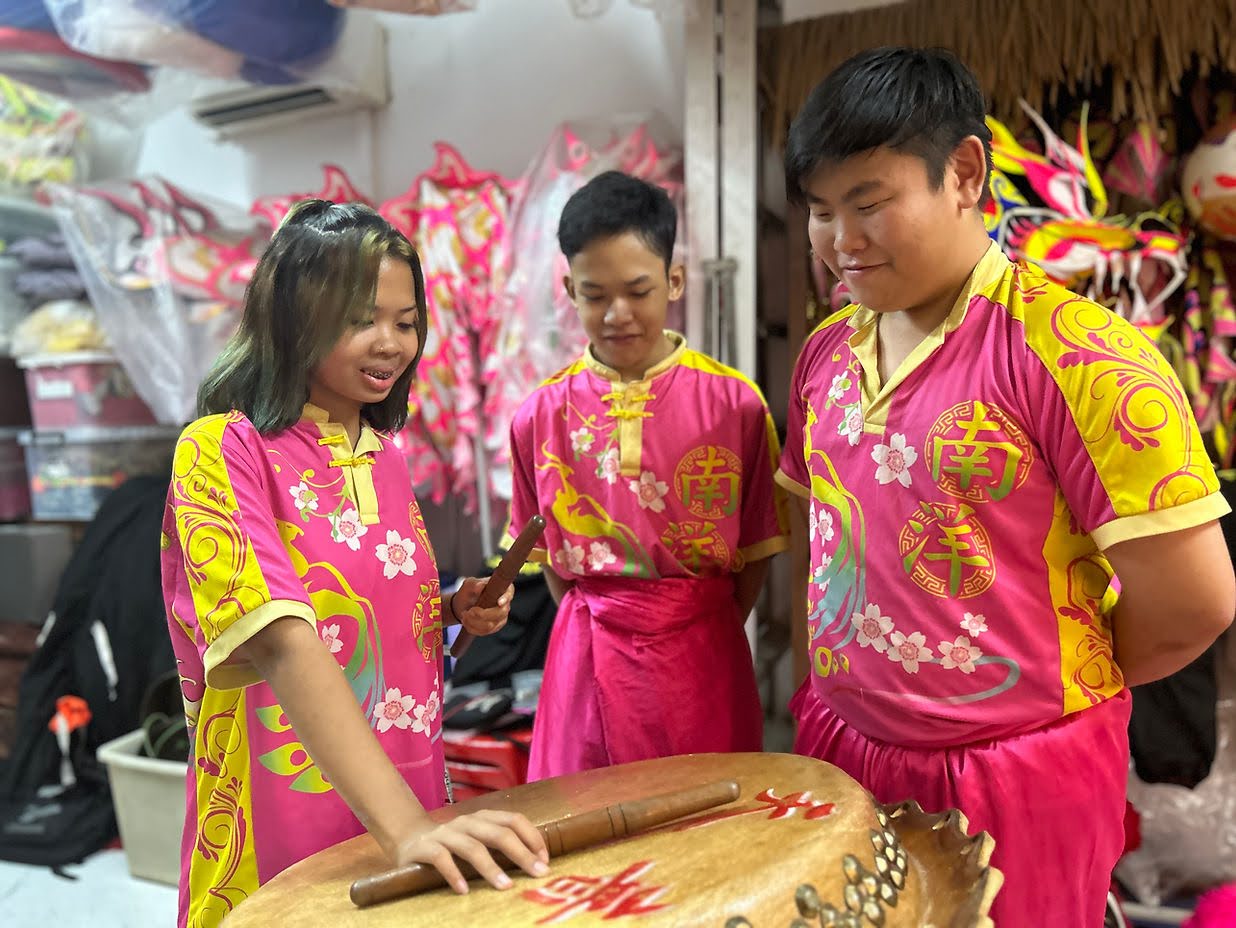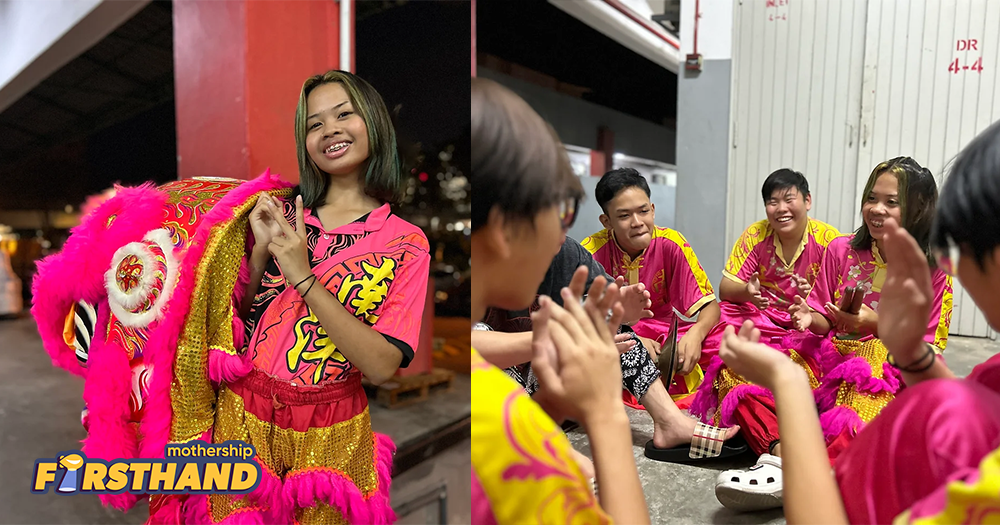By Dini Qistina Binte Ali, Han Xinyi, and Nicolas Goh
The sounds of gongs, cymbals and Chinese drums echo through the halls, drawing attention from passers-by.
Dancing animatedly to the beat of the instrumental ensemble, a Southern Chinese Lion executes a series of graceful feats that keeps its audience rapt from start to finish.
The dance comes to a close. From under the lion costume, two performers reveal themselves — one of whom isn’t quite your average lion dancer.
As the crowd applauds, 15-year-old Nuraini Adeya Binte Yahya hoists up the lion head with pride.
 Nuraini holding up the lion head, which represents power and wisdom. Photo by Nicolas Goh
Nuraini holding up the lion head, which represents power and wisdom. Photo by Nicolas Goh
A Malay girl doing lion dance
Hailing from NamYang Lion Dance Centre Singapore, Nuraini has trained and performed with the troupe for the past two years and counting.
The thought of a Malay girl doing lion dance may raise a few eyebrows, especially since it is typically performed at Chinese festivals, with its practitioners mostly consisting of Chinese men.
But Nuraini has held a fondness for the performing art from a young age.
Although she was not aware of its cultural significance as a kid, she was nonetheless mesmerised by the loud and festive performances.
“Even when I’m halfway through eating or busy with something, I would go down my block just to watch the performance [after hearing the music nearby],” Nuraini recounted.
The more she watched the lions dance and enact impressive stunts on the ground or atop poles, the more intrigued she became with the art.
Her initial fascination eventually grew into something that she aspired to pursue. It did not take long for her to take the plunge and join a lion dance troupe.
 Photo by Nicolas Goh
Photo by Nicolas Goh
Out of her shell and into the lion
Nuraini first played with the idea of joining lion dance nine years ago, at the age of six.
A lion dance troupe had been invited to perform at her tuition centre and showcase the art to students at a cultural event.
It was there that she also got the chance to hold one of the lion heads for the first time. She was immediately drawn to its “cuteness” and inner mechanics.
Over time, this grew into a full-on hope to pursue the art.
But there was a part of Nuraini that initially held her back:
“As the years went by, I still did not have the courage to ask a lion dance troupe if I could join, nor did I know how to go about asking as well.”
“I used to be shy and introverted, and that stopped me from pursuing lion dance much earlier,” she sheepishly admitted.
In today’s local lion dance scene, other races and ethnicities are slowly picking up the craft. Inter-racial and even predominantly Malay lion dance troupes have popped up.
Still, her doubts remained.
But in 2021, while scrolling on Instagram, she came across a recruitment post from a local troupe, NamYang Lion Dance Centre.
Nuraini decided to take the plunge and stepped into the world of lion dance.
Today, she is the only Malay and female troupe member in NamYang, as well as one of a select few who play the role of the lion head.
NamYang’s troupe leader, 49-year-old Peter Goh, shared that “race and gender don’t really matter” in lion dance, which is why he didn’t have any second thoughts bringing Nuraini into the fold.
“To me, I'm grateful for her to be part of my team, being willing to learn the Chinese culture even though she’s of a different race,” he said.
“She has already taken an extra mile to join our troupe and I feel that doing little things to take care of her or my members is not an issue.”
Tackling disapproval and social stigma
It’s been two years since. But the journey hasn’t been easy.
With lion dance being a space dominated by Chinese men, there was some initial pushback from her friends and family.
Upon announcing her plans to learn the art, Nuraini’s family — especially her late mother — voiced their disapproval.
As Nuraini had no prior experience with sports other than physical education classes in school her parents worried for her safety; lion dance performances often combine physically strenuous movements with dexterous feats atop podiums.
There was also the differences in culture and religion.
“They both scolded and disapproved of me joining lion dance because it’s from another culture…they were worried for me as they were scared that a lot of things could happen to me,” she recalled.
It even got to the point where Nuraini was almost grounded for her decision as her parents thought she would be “exposed to bad influences”; lion dance troupes have historically been linked with secret societies and gangs.
 Photo by Nicolas Goh
Photo by Nicolas Goh
Her father, 57-year-old Yahya Bin Mohamed, explained that his initial lack of support was because he thought it would be a distraction from her schoolwork.
Furthermore, lion dance seemed too “dangerous” and there was “no insurance that would cover her”.
“If she falls down or something happens to her, who can I hold responsible?” he added.
Nuraini also faced criticism from her own friends — a handful expressed their distaste towards her decision to pursue lion dance as her hobby.
Some of her Muslim friends called her a “betrayer”. They argued that involving herself in the art form was the equivalent of praying to the Chinese gods.
“So what if I am Malay? Does it mean I cannot do what Chinese people do?” she said, adding that Singapore as a multi-racial society should be open to the fusion of races in cultural activities.
“All I wanted was to live my life to the fullest and try what I like so that I won’t have any regrets.”
At her lowest
Over time, it’s become clear to Nuraini that her fellow lion dance troupe members are anything but the bad influences her father had previously feared.
Instead, they have made her “stronger” when she was at her lowest.
In 2023, Nuraini’s mother was hospitalised in critical condition.
The teenager had to juggle hospital visits, attending lion dance training, and schooling.
Additionally her confidence took a hit after a performance where she overheard an audience member remark that a girl should not touch a lion's head as it “brings bad luck”.
This was probably derived from an old superstition that menstruation contaminates the ritual purity of the practice.
“I started crying at that point and I didn't know what to do or who to talk about my feelings to,” she recalled.
“It made me think twice if I should continue my passion or not.”
Physically and mentally exhausted, the remark on “bad luck” was the final straw that led to a breakdown; it wasn’t the first she’d received.
“My aim in practising lion dance is to bring happiness and joy to others around me through my performances. But all I got in return was negative comments, which made me question myself.
Why do I get this type of treatment? Why am I being discriminated against? What is the point of joining lion dance after this?”
Her turmoil only intensified when her mother passed away a few weeks after a lion dance competition, that had consumed a lot of her free time.
“I regretted not spending time with my mum because I didn't expect her to pass on so quickly,” she said.
“I thought that, after the competition, I would be able to spend more time with her.
But her condition took a turn for the worse.”
On the day of her mother’s passing, two of her troupe mates went down to pay their respects. Others comforted her either in person or through text, telling her to take her time to be with family before returning to the troupe.
As a result, she eventually made the decision to return to the sport.
“Even though my troupe members didn't force me to attend training, I know that lion dance is a commitment and I'm willing to juggle my personal life for this sport that I chose to do,” she said.
 Nuraini competing at her first Ngee Ann City National Lion Dance Championships 2023 as part of her troupe’s instruments team. Photo from Long-Shi.com
Nuraini competing at her first Ngee Ann City National Lion Dance Championships 2023 as part of her troupe’s instruments team. Photo from Long-Shi.com
Finding her bearings
Eventually, Nuraini found her footing. Both her family and friends saw how she thrived in lion dance, and their disapproval shifted to support.
Today, her father wholly approves of her passion. After observing her relationship with the craft over the two years, he now recognises that her troupe environment is “safer than [he] imagined”.
“Last time her mother would properly look after and control her, but now I am afraid that if I control her she would run away and not come home,” he reflected.
“Now if she wants to do lion dance, I will allow her, it’s okay.”
 With her father now being her main source of motivation and pillar of support, Nuraini would often show him her Lion dance performance videos. Photo by Nicolas Goh
With her father now being her main source of motivation and pillar of support, Nuraini would often show him her Lion dance performance videos. Photo by Nicolas Goh
That’s not to say everything is easy.
Nuraini admitted that she sometimes “cannot help but feel left out” from conversations due to language and gender differences.
Nevertheless, she insisted that it does not affect the way they train together.
“Commands and instructions given are mostly given in Mandarin, which makes it difficult for me to understand. But they will help to translate for me,” she said.
She has even taken to learning the language to further familiarise herself with the commands.
 Nuraini teaching her teammates the drumming skills she picked up just last year. Photo by Nicolas Goh
Nuraini teaching her teammates the drumming skills she picked up just last year. Photo by Nicolas Goh
Fellow troupe member Kaygen Lin, 14, shared that he “doesn’t really care” about what others say about him working together with Nuraini as a lion. In the costume, he sees Nuraini as an equal.
“Lion dance is lion dance, we do what we can just to get our desired standard of performance.
Others can say what they want because after all I’m aware that she’s a girl, but the ultimate goal is to put up a good performance for our audience.”
Remaining steadfast in her passion has paid off over the years as it has helped her build both her physical and mental strength.
That’s something that her troupe leader recognises.
“Seeing how much she has grown and improved in her skills in Namyang, I should say that I’m proud to have her as a member of our troupe,” said Goh.
Breaking down barriers
Nuraini understands more than anyone how “lonely” it can be as the odd one out.
Still, she wishes to continue her performances to make people smile and “bring blessings to others”.
For now, her mission is to improve on how she portrays the expression of the lion and master the difficult stunts so that she can have more opportunities to perform in the future.
And while she’s undoubtedly the odd one out, she hopes to make a point and defy the stereotypes of what a lion dance performer ought to be.
“Girls can do it too,” she said.
“I want to continue to prove to everyone that race and gender don't make a difference. If you set your mind to do it, just go for it.
“And if guys can do it, girls can do it, too. If not better.”
This article was produced as part of Republic Polytechnic's media practicum module collaboration with Mothership.
Top image by Nicolas Goh
If you like what you read, follow us on Facebook, Instagram, Twitter and Telegram to get the latest updates.

